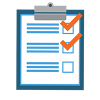Riding the Fourth Wave: How to maintain your mental health during a pandemic?
Written By Jessica Fawcett, MSW, RSW, Mental Health Counsellor
As we enter into a third year of the COVID-19 Pandemic, the word on the street is that a lot of people are feeling exhausted, lonely, disconnected, disappointed, and the list goes on. What everyone believed was going to last two weeks or maybe even just two months, has turned into two years and counting. In the beginning, people were able to psych themselves up to cope because surely there was an end in sight. Unfortunately, since we now know we cannot rely on a definitive end date for what we are collectively experiencing, people are exhausted and quite frankly, just over it. This is what we call Pandemic Fatigue. The World Health Organization (WHO) has defined Pandemic Fatigue as “feeling demotivated about following recommended behaviors to protect ourselves and others from the virus” (Millard, 2021). Unfortunately, since the pandemic has not yet ended, people are left to continue to cope. So how do we cope when we’ve just had enough? Well stick with me while we explore some tips and tools that might just be helpful.  Now, I would like to preface this with a strong acknowledgement that although we are all in the same storm, we are not all in the same boat. Everybody’s situations are going to be unique to them and the level of support each person requires is going to look different. This also means not comparing yourself, your feelings and your situation to anybody else’s. What you’re feeling and what you’re experiencing is valid, and that’s all that matters. These tips and tools are going to be generalized and not specific to any one person’s situation. These tips and tools are merely here to hopefully provide a little support and a little relief if you’re struggling to cope.
Now, I would like to preface this with a strong acknowledgement that although we are all in the same storm, we are not all in the same boat. Everybody’s situations are going to be unique to them and the level of support each person requires is going to look different. This also means not comparing yourself, your feelings and your situation to anybody else’s. What you’re feeling and what you’re experiencing is valid, and that’s all that matters. These tips and tools are going to be generalized and not specific to any one person’s situation. These tips and tools are merely here to hopefully provide a little support and a little relief if you’re struggling to cope.
Check your expectations at the door
First things first, take those expectations you’ve placed on yourself, you know the one’s where you’re thinking you “should or shouldn’t” be feeling a certain way or that there are things you “should” be doing/achieving because you’ve “got a little extra time” and leave them at the door. I know this word might make you cringe, but things continue to be unprecedented. We as human beings are not necessarily meant to remain in a state of survival for this long. That doesn’t mean we can’t manage through it, it just means it’s going to have impacts and we’re just not going to function like we would under “normal” circumstances. There is no manual that tells us how we “should” be managing. So, what can we do instead? We can acknowledge and identify how we are feeling and what we are experiencing, without any judgement attached and leave those expectations in the past.
 Bring it back to the basics
Bring it back to the basics
The basics include sleeping, eating, moving, and playing. There’s a vicious cycle of “the less we do the worse we feel and the worse we feel the less we do” that is so very easy to get caught up in. And this notion can be applied to all of the basics. Sticking to a regular sleep schedule and getting an adequate amount of sleep is an integral part of remaining both physical and mentally healthy. The less sleep we get the worse we feel both physically and mentally, which in turn impacts our sleep and continues to impact our well being. Some simple tips to follow for sleep are: try to go to bed and wake up around the same time each day; try to only use your bed for sleep and intimacy; disconnect from electronics 30-60min before bed; and keep a routine that helps you wind down at night. When it comes to eating, you want to make sure you’re continuing to eat well balanced meals. Also, not eating enough can contribute to low energy and have impacts on your mood. Movement is another important aspect. This doesn’t mean you need to be engaging in daily rigorous exercise, but getting some movement in, even just a walk around the block, can make a big difference. Due to ongoing restrictions, a lot of people’s overall movement has decreased dramatically without even realizing it. Therefore, being intentional about getting some steps in is incredibly important. Finally, we have play. Although we may not be able to engage in certain activities that we had previously been able to enjoy regularly, it is still important to engage in activities that bring you some sort of satisfaction and enjoyment, even if it is small.
Protect your energy and set some boundaries
If there is anything that can help us protect our energy and maintain internal peace, it is boundaries. This might mean boundaries with yourself or boundaries with other people. In terms of boundaries with yourself, this might mean limiting interaction/exposure to things that trigger overwhelming emotions. A common trigger that I have heard about over the pandemic is the news and reporting of COVID related information. So, if you find that constantly hearing news about COVID triggers overwhelming feelings, a good boundary to set with yourself may be to limit your news/media consumption. Also, in the day and age of social media, this may also mean doing a clean up of who you follow or simply “muting” certain accounts so that you do not see the content being posted. If you are currently working from home, boundaries with yourself may also include creating structure to keep your work life and home life separate. Create some structure, outline your work hours and “leave the office” at the end of the day. Just because you have more access to your work outside of work hours doesn’t mean you should access it.
There may also be people in your life you may need to set some boundaries with at all. Many individuals have had to adjust to being around their loved ones in their home constantly, no longer having some time apart through going to work, school or extra curricular activities. With this, it certainly isn’t unexpected that there may be a little more tension within the home. Boundaries with someone you live with might look like a physical space boundary, defining what space in the home is who’s and what that space is to be used for, setting aside alone time, etc. Another boundary that may be helpful to set is one that defines which topics are okay to discuss and which are off the table. If hearing about daily COVID case numbers is something that causes you anxiety, you may ask the other people in your home not to repeat them to you. When it comes to relationships with people outside of your home, some common boundaries you might find helpful to set are which topics you are comfortable discussing; what kind of physical interactions you are comfortable with; how often you are able to see someone; what kind of activities you are comfortable doing; and so on.
Self-Compassion
 The last thing I would like to leave you with is a reminder to show yourself some compassion. When things don’t go right or how you expected them to, how do you talk to yourself? Do you speak kindly to yourself? Or do you speak harshly? The past two years have not been easy (which I know is a big understatement), so it is important that we nurture ourselves and show ourselves kindness and compassion. We are all doing the best we can and that includes you as well. If you’re able, try some of the things discussed in this post and see if you notice a difference. Also remember, we are not wired to do hard things by ourselves, so if you need further support, that is okay! If you’re a patient of the Central Brampton Family Health Team, reach out to your doctor who can provide you with a referral to our counselling services. If you’re not a patient, there are community resources available. https://www.connexontario.ca/en-ca/ is a 24/7, free, online, text and telephone based resource to help you get connected to the support you need. Please, reach out to the supports available if needed!
The last thing I would like to leave you with is a reminder to show yourself some compassion. When things don’t go right or how you expected them to, how do you talk to yourself? Do you speak kindly to yourself? Or do you speak harshly? The past two years have not been easy (which I know is a big understatement), so it is important that we nurture ourselves and show ourselves kindness and compassion. We are all doing the best we can and that includes you as well. If you’re able, try some of the things discussed in this post and see if you notice a difference. Also remember, we are not wired to do hard things by ourselves, so if you need further support, that is okay! If you’re a patient of the Central Brampton Family Health Team, reach out to your doctor who can provide you with a referral to our counselling services. If you’re not a patient, there are community resources available. https://www.connexontario.ca/en-ca/ is a 24/7, free, online, text and telephone based resource to help you get connected to the support you need. Please, reach out to the supports available if needed!
We may not be able to connect in-person at the moment, but we can still stay “connected” in other ways. Join our Mental Health Webinars, every Wednesday at 1 pm via Zoom. For more information on the webinar topics, please visit our Calendar of Events: www.cbfht.ca/events
References
Millard, E. (2021, February 18). How to not let pandemic fatigue turn into pandemic burnout. EverydayHealth.com. Retrieved January 27, 2022, from https://www.everydayhealth.com/coronavirus/how-to-not-let-pandemic-fatigue-turn-into-pandemic-burnout/#:~:text=The%20World%20Health%20Organization%20(WHO,understand%20the%20problem%20and%20propose

